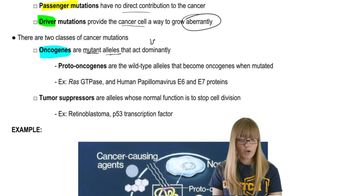Table of contents
- 1. Introduction to Genetics51m
- 2. Mendel's Laws of Inheritance3h 37m
- 3. Extensions to Mendelian Inheritance2h 41m
- 4. Genetic Mapping and Linkage2h 28m
- 5. Genetics of Bacteria and Viruses1h 21m
- 6. Chromosomal Variation1h 48m
- 7. DNA and Chromosome Structure56m
- 8. DNA Replication1h 10m
- 9. Mitosis and Meiosis1h 34m
- 10. Transcription1h 0m
- 11. Translation58m
- 12. Gene Regulation in Prokaryotes1h 19m
- 13. Gene Regulation in Eukaryotes44m
- 14. Genetic Control of Development44m
- 15. Genomes and Genomics1h 50m
- 16. Transposable Elements47m
- 17. Mutation, Repair, and Recombination1h 6m
- 18. Molecular Genetic Tools19m
- 19. Cancer Genetics29m
- 20. Quantitative Genetics1h 26m
- 21. Population Genetics50m
- 22. Evolutionary Genetics29m
19. Cancer Genetics
Cancer Mutations
Problem 9a
Textbook Question
Textbook QuestionGo to the website http://www.cancer.gov and select 'Cancer Types' on the top menu bar. Scroll down to 'Breast Cancer' and click. Select 'Cases & Prevention' from the options. Click 'More information' and select 'BRCA Mutations: Cancer Risk and Genetic Testing'. Use the information on this page to answer the following questions. Are there measures a woman with a positive result can take to lessen her chances of developing cancer or to catch a cancer early in its development?
 Verified Solution
Verified SolutionThis video solution was recommended by our tutors as helpful for the problem above
Video duration:
1mPlay a video:
Was this helpful?
Key Concepts
Here are the essential concepts you must grasp in order to answer the question correctly.
BRCA Mutations
BRCA1 and BRCA2 are genes that produce proteins responsible for repairing damaged DNA. Mutations in these genes can significantly increase the risk of developing breast and ovarian cancers. Understanding these mutations is crucial for assessing cancer risk and determining appropriate preventive measures.
Recommended video:
Guided course

Mutations and Phenotypes
Cancer Prevention Strategies
Women with BRCA mutations can adopt various strategies to reduce their cancer risk, including lifestyle changes such as maintaining a healthy weight, exercising regularly, and limiting alcohol intake. Additionally, they may consider preventive surgeries, such as mastectomy or oophorectomy, and regular screenings to catch cancer early.
Recommended video:
Guided course

Cancer Causes
Genetic Testing and Counseling
Genetic testing for BRCA mutations allows individuals to understand their cancer risk better. Genetic counseling provides support and information about the implications of test results, helping women make informed decisions regarding surveillance, preventive measures, and family planning.
Recommended video:
Guided course

History of Genetics

 4:50m
4:50mWatch next
Master Cancer Mutations with a bite sized video explanation from Kylia Goodner
Start learningRelated Videos
Related Practice


